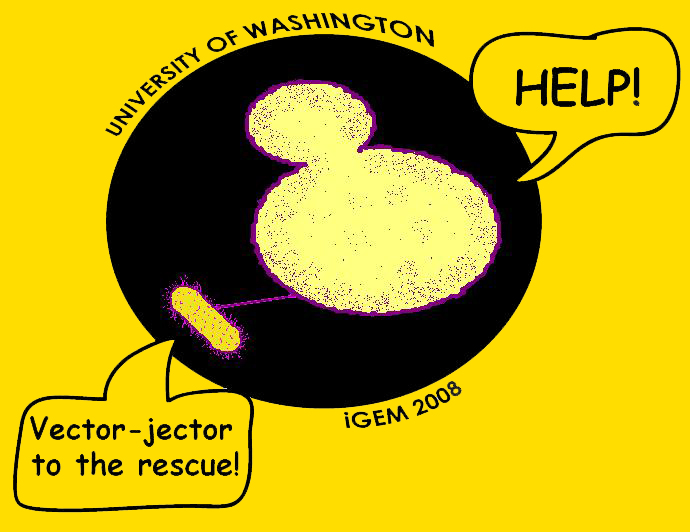Team:University of Washington
From 2008.igem.org
(Difference between revisions)
| (One intermediate revision not shown) | |||
| Line 41: | Line 41: | ||
<h1> Abstract </h1> | <h1> Abstract </h1> | ||
| - | <h5>Transferring novel abilities into eukaryotes has many potential applications. Our project attempts to control transfer of genetic material across phylogenetic domains. We attempt to direct the prokaryote Escherichia coli (domain Bacteria) to transfer DNA encoding potentially useful traits from to the yeast Saccharomyces cervisiae (domain Fungi). The design utilizes standard engineering and synthetic biology techniques to modularize this process, in order to enable usage across varying organisms and conditions. To achieve control over our system, bacteria transfer DNA via conjugation only if certain conditions are met. In our design, E. coli transfers the genes to metabolize lactose in S. cerevisiae, but only where lactose is prevalent, glucose is minimal, and yeast proximity is sensed via a yeast-produced signaling molecule. It therefore provides a means for conditional, not constitutive, gene transfer between diverse organisms. Applications might include the production of transgenic plants and animals, clinical gene delivery, and interacting multiple-organism systems. </h5> | + | <h5>Transferring novel abilities into eukaryotes has many potential applications. Our project attempts to control transfer of genetic material across phylogenetic domains. We attempt to direct the prokaryote <i>Escherichia coli</i> (domain Bacteria) to transfer DNA encoding potentially useful traits from to the yeast <i>Saccharomyces cervisiae</i> (domain Fungi). The design utilizes standard engineering and synthetic biology techniques to modularize this process, in order to enable usage across varying organisms and conditions. To achieve control over our system, bacteria transfer DNA via conjugation only if certain conditions are met. In our design, <i>E. coli</i> transfers the genes to metabolize lactose in <i>S. cerevisiae</i>, but only where lactose is prevalent, glucose is minimal, and yeast proximity is sensed via a yeast-produced signaling molecule. It therefore provides a means for conditional, not constitutive, gene transfer between diverse organisms. Applications might include the production of transgenic plants and animals, clinical gene delivery, and interacting multiple-organism systems. </h5> |
| - | |[[Image:vectorjector. | + | |[[Image:vectorjector.jpg|400px]] |
|} | |} | ||
<!--- The Mission, Experiments ---> | <!--- The Mission, Experiments ---> | ||
Latest revision as of 23:46, 27 October 2008

| Home | The Team | The Project | Modeling | Notebook | Protocols | Parts Submitted to the Registry | Measurement Kit | SeToB | Safety |
|---|
 "
"
